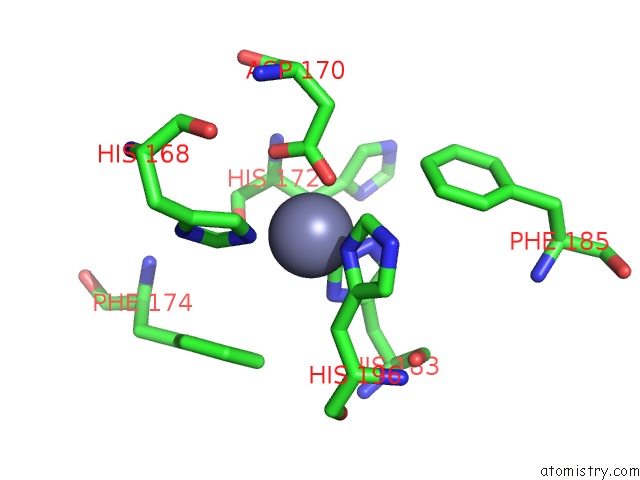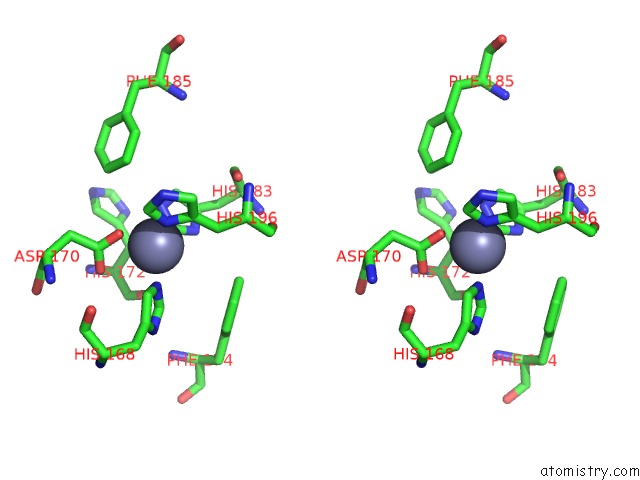Zinc »
PDB 3lju-3lt9 »
3lka »
Zinc in PDB 3lka: Catalytic Domain of Human Mmp-12 Complexed with Hydroxamic Acid and Paramethoxy-Sulfonyl Amide
Enzymatic activity of Catalytic Domain of Human Mmp-12 Complexed with Hydroxamic Acid and Paramethoxy-Sulfonyl Amide
All present enzymatic activity of Catalytic Domain of Human Mmp-12 Complexed with Hydroxamic Acid and Paramethoxy-Sulfonyl Amide:
3.4.24.65;
3.4.24.65;
Protein crystallography data
The structure of Catalytic Domain of Human Mmp-12 Complexed with Hydroxamic Acid and Paramethoxy-Sulfonyl Amide, PDB code: 3lka
was solved by
V.Calderone,
with X-Ray Crystallography technique. A brief refinement statistics is given in the table below:
| Resolution Low / High (Å) | 36.91 / 1.80 |
| Space group | C 1 2 1 |
| Cell size a, b, c (Å), α, β, γ (°) | 51.566, 60.194, 54.215, 90.00, 115.09, 90.00 |
| R / Rfree (%) | 16.9 / 21 |
Other elements in 3lka:
The structure of Catalytic Domain of Human Mmp-12 Complexed with Hydroxamic Acid and Paramethoxy-Sulfonyl Amide also contains other interesting chemical elements:
| Calcium | (Ca) | 3 atoms |
Zinc Binding Sites:
The binding sites of Zinc atom in the Catalytic Domain of Human Mmp-12 Complexed with Hydroxamic Acid and Paramethoxy-Sulfonyl Amide
(pdb code 3lka). This binding sites where shown within
5.0 Angstroms radius around Zinc atom.
In total 2 binding sites of Zinc where determined in the Catalytic Domain of Human Mmp-12 Complexed with Hydroxamic Acid and Paramethoxy-Sulfonyl Amide, PDB code: 3lka:
Jump to Zinc binding site number: 1; 2;
In total 2 binding sites of Zinc where determined in the Catalytic Domain of Human Mmp-12 Complexed with Hydroxamic Acid and Paramethoxy-Sulfonyl Amide, PDB code: 3lka:
Jump to Zinc binding site number: 1; 2;
Zinc binding site 1 out of 2 in 3lka
Go back to
Zinc binding site 1 out
of 2 in the Catalytic Domain of Human Mmp-12 Complexed with Hydroxamic Acid and Paramethoxy-Sulfonyl Amide

Mono view

Stereo pair view

Mono view

Stereo pair view
A full contact list of Zinc with other atoms in the Zn binding
site number 1 of Catalytic Domain of Human Mmp-12 Complexed with Hydroxamic Acid and Paramethoxy-Sulfonyl Amide within 5.0Å range:
|
Zinc binding site 2 out of 2 in 3lka
Go back to
Zinc binding site 2 out
of 2 in the Catalytic Domain of Human Mmp-12 Complexed with Hydroxamic Acid and Paramethoxy-Sulfonyl Amide

Mono view

Stereo pair view

Mono view

Stereo pair view
A full contact list of Zinc with other atoms in the Zn binding
site number 2 of Catalytic Domain of Human Mmp-12 Complexed with Hydroxamic Acid and Paramethoxy-Sulfonyl Amide within 5.0Å range:
|
Reference:
V.Borsi,
V.Calderone,
M.Fragai,
C.Luchinat,
N.Sarti.
Entropic Contribution to the Linking Coefficient in Fragment Based Drug Design: A Case Study. J.Med.Chem. V. 53 4285 2010.
ISSN: ISSN 0022-2623
PubMed: 20415416
DOI: 10.1021/JM901723Z
Page generated: Sat Oct 26 08:41:04 2024
ISSN: ISSN 0022-2623
PubMed: 20415416
DOI: 10.1021/JM901723Z
Last articles
Zn in 9MJ5Zn in 9HNW
Zn in 9G0L
Zn in 9FNE
Zn in 9DZN
Zn in 9E0I
Zn in 9D32
Zn in 9DAK
Zn in 8ZXC
Zn in 8ZUF